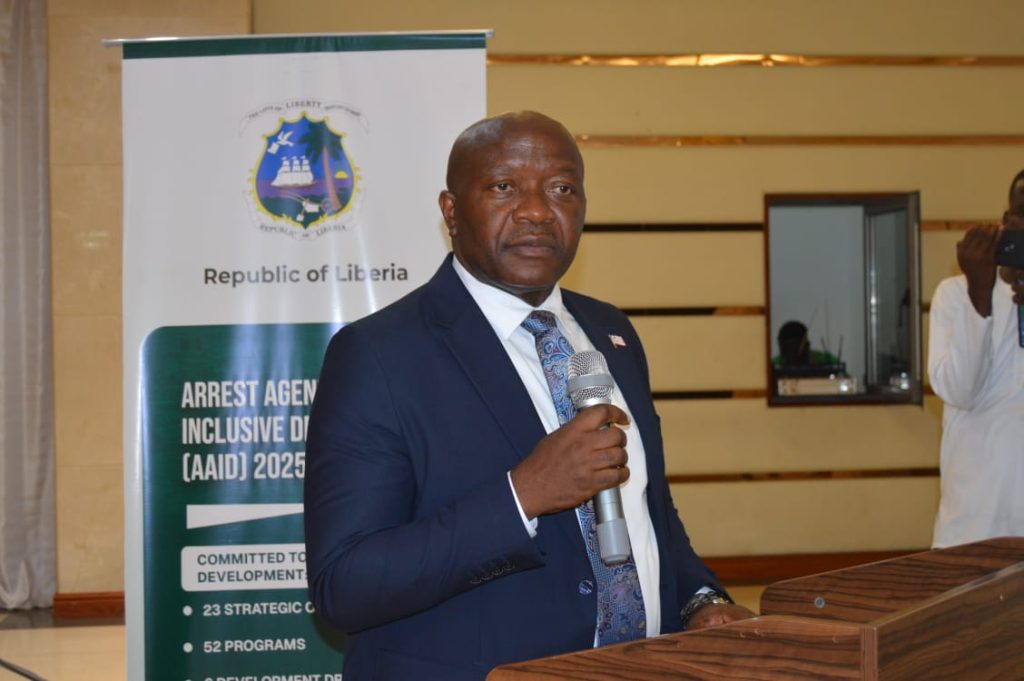Liberia’s Finance and Development Planning Minister, Augustine Kpehe Ngafuan, addressed security institutions during budget hearings, emphasizing the interconnectedness of security expenditures and national revenue generation. He acknowledged the challenging economic outlook for the 2026 fiscal year, but stressed that the security sector plays a dual role: it requires funding but also indirectly contributes to revenue growth by fostering a stable environment conducive to business and investment. This stability, Ngafuan argued, attracts businesses, boosts investment, and ultimately increases national revenue, allowing for larger budgetary allocations across all sectors, including security. He used the metaphor of a growing cake, illustrating that even a small slice of a large cake is more substantial than a large slice of a small cake. Beyond the budgetary discussions, Ngafuan addressed the government’s commitment to improving the welfare of security personnel, acknowledging past shortcomings in meeting insurance obligations. He highlighted the government’s efforts to rectify this by providing supplementary funds to support insurance coverage for security personnel, recognizing their crucial role in national stability and development.
The Minister also underscored the government’s focus on combating drug trafficking and abuse, emphasizing President Joseph Boakai’s prioritization of anti-drug initiatives as a critical component of safeguarding Liberia’s future. This commitment reflects the understanding that drug-related issues pose a significant threat to the nation’s long-term stability and progress. Ngafuan’s statements during the budget hearings highlighted the government’s multi-faceted approach to security, encompassing not only financial considerations but also the welfare of security personnel and the critical fight against drug-related challenges.
Concurrent with the budget hearings, Deputy Finance Minister Bill McGill Jones advocated for legislative support of the National Service Program (NSP), a government-led youth empowerment initiative overseen by the Ministry of Youth and Sports. Designed to equip young people and women with valuable skills and experience through structured service, civic engagement, and professional development, the NSP represents a significant investment in Liberia’s future workforce. Jones stressed the importance of empowering youth as current leaders, not just future leaders, emphasizing their crucial role in shaping the nation’s trajectory. He emphasized the program’s focus on gender inclusion, particularly the empowerment of women and girls, as a core element of the NSP’s mission.
The NSP, with its ten programmatic pillars and widespread implementation across multiple counties, demonstrates the government’s commitment to aligning youth development with national goals for peace, unity, and progress. Jones’s passionate advocacy for the NSP reflects the government’s recognition of the vital role young people play in driving national development and the urgent need to invest in their potential. His call for a collaborative approach, involving all sectors of government and society, highlights the program’s ambition to create a sustainable model for national development.
The official launch of the NSP further emphasized its significance as a transformative initiative. Minister of Youth and Sports, Cllr. Jeror Cole Bangalu, underscored the program’s aim to empower and develop young people, praising President Boakai’s dedication to youth advancement and describing the NSP as central to the government’s development agenda. The program received international recognition with United Nations Resident Coordinator Christine Umutoni commending its transformative potential and alignment with the Sustainable Development Goals (SDGs), demonstrating the global relevance of youth empowerment initiatives.
Project Coordinator F. Alphonso Y. Belleh II articulated the ambitious scope of the NSP, targeting 25,000 beneficiaries over five years. He highlighted the program’s comprehensive approach, encompassing vocational training, education, entrepreneurship, and professional development, demonstrating its commitment to providing diverse opportunities for young people. Belleh’s appeal for sustained support from government, partners, and the private sector underlined the importance of collaborative investment in Liberia’s youth. He framed this investment not as mere financial contribution, but as a profound act of solidarity with the nation’s most vulnerable population, reflecting the NSP’s commitment to inclusive development. This emphasis on youth empowerment, complemented by the government’s focus on security and fiscal responsibility, underscores Liberia’s multifaceted approach to building a stable and prosperous future.


